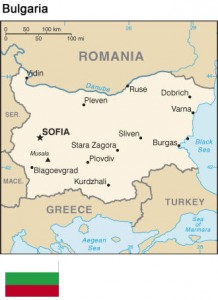Bulgaria: Weekend Of Discontent
By SETimes
Traffic along key roads in all major Bulgarian cities was disrupted Sunday (March 27th) afternoon as long columns of cars moved at a snail’s speed during a nationwide protest against rising fuel prices in the Balkan nation.
The rally, organised by the “No To High Fuel Prices” group via Facebook, was the second to be held in the country over the issue this month. It took place just four days after a one-month freeze on retail diesel prices was announced. The move was part of a deal the centre-right government of the Citizens for the European Development of Bulgaria (GERB) struck with Lukoil Bulgaria, which runs the country’s sole oil refinery, in co-ordination with fuel traders and haulage companies.
A day later however the Bulgarian unit of the Russian oil company raised wholesale diesel prices for other distributors and large consumers above the level of retail prices on the day the agreement was signed.

Fuel prices in the Balkan country, the EU’s poorest member, have been rising since tension started building up in Libya and North Africa. During several days in March, diesel prices in Bulgaria remained higher than in up to 11 other much richer EU nations, Luxembourg among them.
Participants in Sunday’s protest however disagreed that the fuel price surge in Bulgaria was linked to the ongoing crisis in Libya, arguing that the fuels imported in the country originate in Russia, not the oil-rich North African nation. They also accused Prime Minister Boyko Borisov’s government of allowing the Burgas-based refinery to take advantage of the turmoil there.
A statement issued by the “No To High Fuel Prices” group Sunday said that the measures taken by the government last week to tame fuel prices were insufficient and would produce a short-term effect only.
“Not to mention that they distort the free market and harm the normal competitive environment,” it added.
Sunday’s rallies followed an anti-government protest in Sofia the previous day, which was called by the main opposition Bulgarian Socialist Party (BSP) and dubbed “red penalty card for the cabinet”. That rally was reportedly attended by 18,000 people from all over the country.
BSP leader Sergey Stanishev, who served as Bulgaria’s prime minister until July 2009, called for the GERB government’s resignation, accusing it of incompetence and lack of capacity to lead the country out of the crisis.
Meanwhile, the government is facing also a protest Wednesday against the construction of the Belene nuclear power. The rally, organised by the Green Party and the right-wing Democrats for Strong Bulgaria, will be held in front of the Council of Ministers’ and the presidency buildings, less than two weeks after Borisov said in a TV interview that “yes, of course, we will build Belene.” Later reports suggested that Bulgaria and Russia would sign an agreement imposing a 3-month moratorium on the project in the coming days.
An opinion poll conducted by the Alpha Research agency in the wake of the March 11th 9.0-magnitude earthquake and tsunami in Japan showed that public support for the project has shrunk to 51%, down from 75% in 2007. Of the 800 respondents in the survey, 45% opposed building the planned second nuclear plant in Belene, while 4% had no opinion on the issue.
